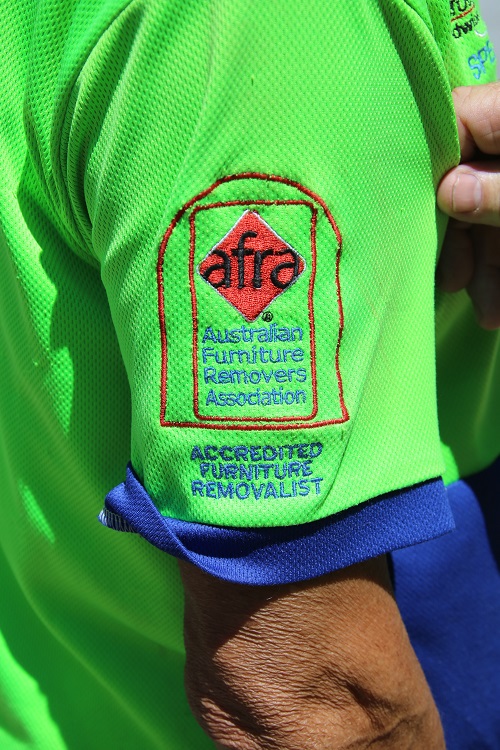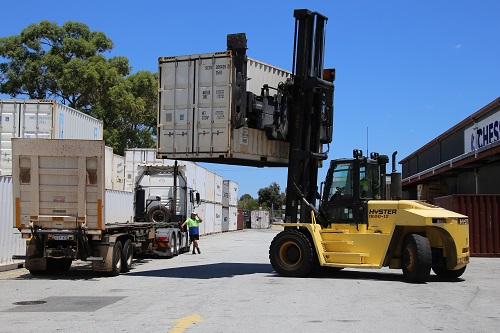Steve Jordan dropped in to see an old friend in Perth, Australia, to chat about the business and to speculate on what the future may hold.

It was a warm (I might say hot) morning at the Fremantle cruise terminal when I spotted the familiar face of Kim Moseley waiting to pick up my wife and I after a short holiday. It’s always a slightly surreal feeling when you first meet someone you know in an unfamiliar place; although you are hoping and expecting to meet them, it’s still a surprise when you do: the welcoming glow of the past amidst the harsh glare of the present.
I had never been to Fremantle before (which, by the way, instantly became one of my favourite places anywhere) and I hadn’t been to Perth for 30 years so Kim’s brief guided tour of his isolated, pristine city was a real treat.
Kim’s company is called Chess Moving. The offices and warehouse are located in an industrial centre in Kewdale in the east of the city, close to the airport. I say ‘industrial’ but that doesn’t really give the right impression. The word conjures up images of belching chimneys and close-packed factories, but that’s not the Perth way. It’s more a leafy suburb with warehouses. Just like the rest of the city, it’s virtually spotless.
In the 1970s, Kim worked for J Wilson Removals in Perth, a company that had operations throughout Australia and connections back to the early 19th century settlers of what was then the Swan River Colony. When the company fell upon hard times Kim, and his then business partner Kevin Rowe, bought the Perth operation from the liquidator and set about building it back to success. At that time the company had around a dozen employees, significant business in the north-west serving the mining community, and some storage.
Moving in Australia was a tough business in those days. Interstate moving was done on high-volume trailers that would traverse the whole country with a single driver, employing the local agents’ crews to help with the delivery at destination. It was particularly bad for consignments going north. “In the old days the bitumen stopped at Carnarvon and didn’t go all the way to Karratha (1500km from Perth and the main port for the mining industry),” explained Kim. “The weather was pretty tough up there too.” Today the interstate work is all done in containers by rail. “It’s much cheaper and more flexible.”
Despite the inherent difficulties, Kim and Kevin’s project worked well but when Kevin headed east to open up in Sydney, Kim took over 100% ownership in Perth.
 Kim was quick to recognise at that time that it would be international work that would create the growth he was looking for. In the early 1980s he joined BAR (British Association of Removers), jumped on a plane and started making contacts. “We wouldn’t have been able to do it without BAR,” he said. “We had to belong because it was the only way we could meet everyone in the same place. It was a big investment but it did kick-start the process of getting us into the international market.”
Kim was quick to recognise at that time that it would be international work that would create the growth he was looking for. In the early 1980s he joined BAR (British Association of Removers), jumped on a plane and started making contacts. “We wouldn’t have been able to do it without BAR,” he said. “We had to belong because it was the only way we could meet everyone in the same place. It was a big investment but it did kick-start the process of getting us into the international market.”
As well as getting the international work, Kim and his team also had to learn how to handle it. Staff had to be trained in the handling and packing requirements of international work and administration staff had to become familiar with shipping and airfreight documentation. Although inbound work, in the shape of migrants recruited largely to meet the needs of the mining companies, came in quickly, J Wilson needed to generate enough export work to provide the reciprocation the UK origin agents expected. There were no consolidators in Australia so Kim had to start filling 20ft containers straight away.
“In the early days we could only manage 5-1 reciprocation,” Kim explained. “But eventually the figures improved.” He said that they were able to get the work, in the face of stiff competition, by making sure they did the job right. “We had to focus heavily on staff training, but it was cash flow that was the biggest problem in the early days.” With the origin agent customer at the other side of the world, that was an inherent problem with the international business.
The name Chess was coined in 1995. It’s supposed to relate to ‘making a smart move’ but Kim admits that any clever meaning is not something that troubles him. It was a way of competing nationally and internationally with the big name companies. “We were dealing with individual movers on the east coast and we felt it would be a good idea to have a common name for marketing,” he explained. “So we formed Chess Moving Australia and currently there are shareholders in Perth, Sydney, Adelaide, Melbourne, Brisbane, Hobart, Launceston, Canberra, Cairns, Toowoomba and Townsville. All the owners have equal shares in Chess while retaining their own PTY companies.”
As well as the marketing benefits of the Chess name the formal cooperation between its members allows it to invest in multi-use materials that can be used between depots while remaining within the group. This gives the company a tremendous advantage over local companies that cannot use these high-quality materials in such an economic way.
But the key to success for Kim has always been his people. A number of the staff have been with the company for 20 years or more including John Rowe (Kevin’s son), the operations manager, now in his 50s, who has never worked anywhere else; and Rohan Coutinho, the international manager, who has also been there all his working life. “I am pretty keen to keep the people who do the right thing,” said Kim. “You have to acknowledge them and treat them the right way. Long-term employees help to settle a business down rather than waste time bringing in people without the right experience.”
 Today the business looks very different than it did when Kim bought it. It has moved four times to bigger premises, employs around 70 people, 30% of its work is international, 25% interstate and the rest made up of storage, business moving, and some corporate work. Chess Moving in Perth also has a thriving document storage and management company, Integrated Records Management, within the confines of its household goods warehouse. “One of the benefits of records management is that it’s constant,” said Kim. “You are not worried about what the sales are going to be next week because it’s all there.”
Today the business looks very different than it did when Kim bought it. It has moved four times to bigger premises, employs around 70 people, 30% of its work is international, 25% interstate and the rest made up of storage, business moving, and some corporate work. Chess Moving in Perth also has a thriving document storage and management company, Integrated Records Management, within the confines of its household goods warehouse. “One of the benefits of records management is that it’s constant,” said Kim. “You are not worried about what the sales are going to be next week because it’s all there.”
Traditional storage, however, so important for moving companies, has fallen off significantly in recent years as self storage has gained in popularity. Kim said that he has often been tempted to open his own self storage facility but the right place hasn’t come along yet. “I should have done it 15 years ago.”
Kim admits that the last few years have been ‘rocky’. The downturn in the economy has had a negative effect on the mining industry on which Western Australia so heavily relies. However, Kim continues to drive the business forwards and has embraced technology as a tool to do so. Justin Davies has worked with Kim for many years and now focusses on the company’s use of technology and social media as part of its marketing strategy.
“Online marketing is a bit like prospecting for gold in Kalgoorlie,” he explained. “Once upon a time you could wander around and pick up nuggets but now you have to find new ground or get smarter with your mining.”
Holding up a smartphone Justin said: “Millennials do not understand that you make calls with these things. So you have to work out different ways of getting in touch. We are working out new ways of automating the marketing process and they need constant tweaking to keep them successful.”
The company uses video surveys, however they are not as useful as it might appear in such an expansive country as Australia. In WA most of the business is concentrated in a local area around Perth and the coast, so personal surveys are still practical and allow a better opportunity to build a relationship with the customer.
Kim has accredited the company for ISO 9001: 2008 for Removals, Move Management and related services and AS/NZS 4801: 2001 Occupational Health and Safety Management Systems. He’s currently looking to add the environmental and data protection standards too. He believes in Standards, not because they allow him to get more business but because they enable him to run his business better.
.jpg?sfvrsn=d49c977b_2) But most important for Kim is his workforce and the training they receive. Brian Hooper has been with the company for 30 years and is in charge of training. As part of their training he gets the export packers to pack a china carton then throw it off the balcony in the warehouse. They keep repacking it until nothing breaks.
But most important for Kim is his workforce and the training they receive. Brian Hooper has been with the company for 30 years and is in charge of training. As part of their training he gets the export packers to pack a china carton then throw it off the balcony in the warehouse. They keep repacking it until nothing breaks.
“We have a thirteen-phase training programme that everyone goes through,” said Brian. “It covers packing, handling, safety, loading, international wrapping, customer service, leadership – the whole job.” Brian also attends most of the jobs so if he sees something that’s not right he can correct it straight away. Chess awards its own certificates and badges so that the staff get recognition from the company and customers can see that they have been fully trained.
On the wall in the Chess boardroom, as with many such rooms I have seen around the world, are the company values. It talks about honesty, morality, responsibility, reliability and integrity. I asked, perhaps mischievously, if the staff would be able to recite them. Kim said some probably would but that wasn’t really the point. They are his values and, as in any organisation, the way in which the boss behaves influences the behaviour of everyone else. “That’s just the way we do things here,” he said.
Photos: Middle right: Chess staff wear badges to show their packing qualifications;
Top, left to right: Brian Hooper, Training and Quality Manager (30 years’ service); Mick Moso, Mover and Driver (20 years’ service); Spencer Wong, Export Packer (29 years’ service); Hayley Richards, Packer (3 years’ service); and Kim Moseley, Managing Director; bottom left: the new Hyster lift truck automatically provides the VGM (Verified Gross Mass) to help Chess meet SOLAS regulations, Bottom right: Brian Hooper in the Chess training room.
Click here to see the next Editor's Pick